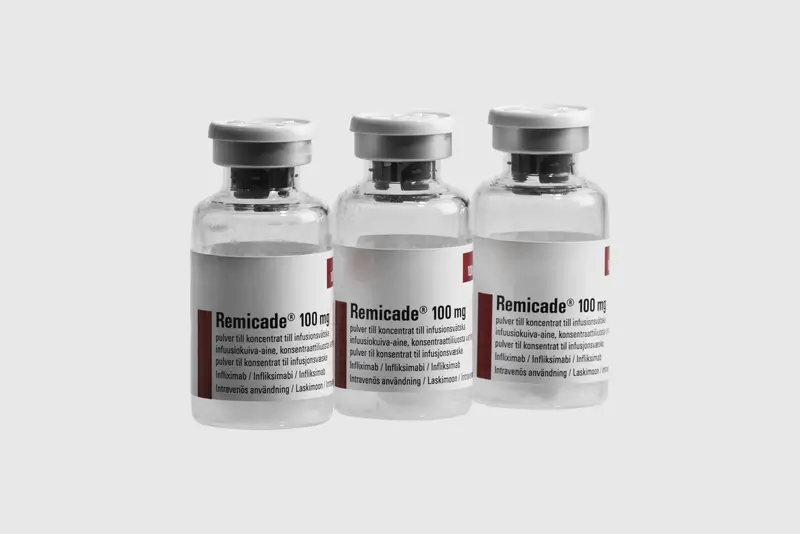Only for Licensed Professionals
Only for Licensed Professionals
.webp)
Generic Name of Remicade – About Infliximab
David Fuller
Last Updated On: July 8, 2025
In the U.S., nearly 90% of all prescriptions are for generic drugs, providing a more affordable alternative to branded medications and increasing patient accessibility. For a drug to qualify as a generic, it must meet strict FDA standards, ensuring that it matches the brand-name product in terms of active ingredients, strength, and therapeutic effects. However, when it comes to biologics like Remicade, the story is a bit different.
Remicade, the brand name for infliximab, is a biologic used to treat autoimmune disorders like Crohn’s disease and rheumatoid arthritis. Though not a traditional generic, infliximab has been marketed as biosimilars, offering nearly identical benefits at a lower cost. Unlike conventional generics, biosimilars are highly similar versions of biologic drugs and must undergo rigorous testing to ensure they match the original in terms of safety, efficacy, and purity.
In this article, we’ll take a closer look at the generic name of Remicade, infliximab, and compare it to its biosimilars, exploring how they work, their therapeutic uses, and the impact they have on treatment accessibility and affordability.
Key Takeaways
- Infliximab, the generic name of Remicade, is a biologic therapy that targets tumor necrosis factor-alpha (TNF-α) to reduce inflammation in autoimmune diseases, such as Crohn’s disease, rheumatoid arthritis, and ulcerative colitis.
- Biosimilars of infliximab, including Inflectra and Renflexis, offer a more affordable alternative with no clinically meaningful differences in safety, efficacy, or potency compared to Remicade.
- Biosimilar versions of infliximab may have slight differences in formulation or inactive ingredients, but clinical trials confirm their equivalence in treating the same conditions.
- Healthcare providers should guide the switch from Remicade to a biosimilar to ensure therapeutic consistency and to monitor for potential side effects.
- Common side effects of infliximab include infusion reactions, headaches, nausea, and an increased risk of infections due to immune suppression.
- Long-term use of infliximab can cause serious risks, including liver damage, heart problems, blood disorders, and a slightly higher risk of cancer.
- Medical professionals should regularly monitor patients on infliximab, including blood tests, antibody screening, and regular checks for signs of infection or other serious adverse reactions.
- Healthcare teams must educate patients about potential side effects, the importance of adhering to treatment plans, and when to report new or unusual symptoms.
About: Operating since 2016, Med Supply Solutions is known for being one of the industry’s top and trusted suppliers of cosmetic and viscosupplementation products. If you’re interested in purchasing Remicade online, please contact our sales department for more information.

Understanding Infliximab as a Monoclonal Antibody

Infliximab is a chimeric monoclonal antibody that specifically targets and blocks tumor necrosis factor-alpha (TNF-α), a protein that plays a pivotal role in the inflammatory process. By neutralizing this protein, infliximab helps reduce inflammation, thus halting the immune response that contributes to tissue damage in autoimmune diseases.
Administered via intravenous infusions, infliximab is usually scheduled every 6 to 8 weeks after the initial loading doses. One of the benefits of infliximab is its targeted mechanism, which allows it to provide relief for patients with fewer systemic side effects compared to traditional immunosuppressants.
It is FDA-approved for treating several chronic conditions, including Crohn’s disease, rheumatoid arthritis, and ulcerative colitis, and has become a cornerstone in biologic therapy for these diseases.
The Evolution from Remicade to Biosimilar Infliximab Products

Remicade was the first infliximab product approved by the FDA in 1998, making it a pioneer in TNF inhibitors. Over the years, however, the cost of biologic therapies like Remicade led to the development of biosimilars, which are nearly identical to the original biologic drugs but are often available at a lower price point.
These biosimilars, which include Inflectra, Renflexis, and Avsola, offer the same clinical benefits as Remicade while providing more affordable options for long-term treatment.
Although biosimilars use the same active ingredient, there may be slight differences in their formulation, packaging, and manufacturing processes. Despite these small variations, clinical trials have shown that the biosimilars match Remicade in terms of safety, efficacy, and purity. These biosimilars have been a game-changer in increasing access to infliximab therapy, as their lower cost enables greater patient access and affordability.
How Infliximab Compares to Its Brand-Name Originator
As the use of biosimilars like Inflectra and Renflexis becomes more common, a frequent concern among both patients and healthcare providers is how they compare to the original Remicade product.
While biosimilars are designed to be clinically identical to the brand-name biologic, infliximab, minor differences in inactive ingredients or formulation may lead to slight variations in how the medication behaves in some patients. However, clinical trials consistently confirm that biosimilars are as safe and effective as Remicade.
Below is a comparison of Remicade with two FDA-approved biosimilars:
| Feature | Remicade (Brand) | Inflectra (Biosimilar) | Renflexis (Biosimilar) |
| Generic Name | Infliximab | Infliximab-dyyb | Infliximab-abda |
| Manufacturer | Janssen Biotech, Inc. | Pfizer (Celltrion) | Merck & Co. (Samsung Bioepis) |
| FDA Approval | 1998 | 2016 | 2017 |
| Indications | Same across all products | Same as Remicade | Same as Remicade |
| Clinical Efficacy | Proven in original clinical trials | Demonstrated equivalence in studies | Demonstrated equivalence in studies |
| Administration | IV infusion | IV infusion | IV infusion |
| Infusion Reaction Rate | Low to moderate | Slightly variable | Slightly variable |
| Inactive Ingredients | Brand-specific formulation | May differ slightly | May differ slightly |
| Cost | Higher | Typically 15–30% lower | Typically 15–30% lower |
The side effects of Remicade, including infections, fatigue, and infusion reactions, are consistent across all three products, so patients should work closely with their healthcare provider to ensure continuity and consistency of care.
Prescribing Infliximab: Considerations for Switching or Substituting
Switching from Remicade to a biosimilar is a decision that should be made in consultation with your healthcare provider. Although clinical trials have shown that switching between Remicade and biosimilars is safe and effective for most patients, it is essential for healthcare providers to monitor patients closely after the switch to ensure treatment consistency.
Some important considerations for switching include the patient’s medical history, the insurance coverage for biosimilars, and the protocols of the infusion center. Some patients who have done well on Remicade may feel uneasy about switching to a biosimilar, even though the biosimilars provide the same therapeutic benefits. In such cases, it’s crucial to address concerns and provide clear information about the equivalence of biosimilars to Remicade.
What Medical Professionals Should Know About Infliximab Therapy
For clinicians, understanding infliximab treatment is crucial to achieving the best outcomes for patients. They should monitor the drug’s effectiveness, especially in long-term use. Regular testing of antibody levels is vital, as patients may develop neutralizing antibodies that can affect the drug’s effectiveness.
Then, before starting infliximab therapy, ensure the patient is free from contraindications such as:
- Active infections (e.g., tuberculosis)
- Severe heart failure
- Any serious liver conditions
These conditions can worsen due to the immunosuppressive nature of the medication.
Baseline Testing and Side Effect Monitoring
Clinicians must also conduct tests to assess the patient’s suitability for treatment:
- Tuberculosis screenings
- Liver function tests
- Blood cell count analysis
For ongoing therapy, regular follow-ups are necessary to detect potential side effects. The healthcare professional should watch for signs of infections (e.g., fever, sore throat). They should also monitor for infusion reactions (e.g., chest tightness, difficulty breathing) and track fatigue and other common complaints. Early detection allows for timely interventions.
Adjustments Based on Response and Patient Education
Depending on the patient’s clinical response, dosage and frequency may need to be adjusted. It is important to base these changes on laboratory findings and the patient’s overall health condition.
Moreover, the administering professional should ensure that patients understand the importance of reporting any unusual symptoms. Educate them about possible side effects, such as swelling, chest tightness, and shortness of breath, which should be reported immediately.
By maintaining consistent monitoring and addressing any issues early, medical professionals can optimize infliximab therapy and minimize risks associated with the drug.
Conclusion
Infliximab, known by its brand name Remicade, has revolutionized the treatment of autoimmune diseases. The advent of biosimilars has made this therapy more accessible and affordable for patients. While biosimilars like Inflectra and Renflexis are clinically equivalent to Remicade, slight variations in formulation and inactive ingredients might lead to minor differences in patient responses. Regardless, both Remicade and its biosimilars continue to provide effective relief for chronic inflammatory conditions.
Healthcare providers must ensure patients are well-informed about infliximab’s benefits and potential side effects, including Remicade side effects, and guide them through the decision-making process for switching medications. With proper management and monitoring, infliximab remains a key tool in the fight against autoimmune disorders.
FAQs
1. What is the generic name of Remicade?
The generic name of Remicade is infliximab. It’s a biologic drug classified as a monoclonal antibody that targets TNF-α and is used in various autoimmune conditions.
2. Are infliximab biosimilars as effective as Remicade?
Yes, FDA-approved biosimilars, such as Inflectra, Renflexis, and Avsola, have demonstrated equivalent efficacy and safety compared to Remicade in clinical trials.
3. Can I safely switch from Remicade to a biosimilar?
Most patients can switch safely under a doctor’s supervision. Monitoring is recommended to ensure continued therapeutic response and to detect any new side effects.
4. Are the side effects of infliximab the same as Remicade?
Yes. Since infliximab is the active ingredient in both Remicade and its biosimilars, the side effects generally apply to all versions of the drug.
References
Ebert EC. Infliximab and the TNF-alpha system. Am J Physiol Gastrointest Liver Physiol. 2009;296(3):G612-G620. doi:10.1152/ajpgi.90576.2008
Fatima R, Bittar K, Aziz M. Infliximab. StatPearls – NCBI Bookshelf. Published March 21, 2024. https://www.ncbi.nlm.nih.gov/books/NBK500021/
Association for Accessible Medicines. 2024 U.S. generic & biosimilar medicines savings report. AccessibleMeds website. Published January 2025. https://accessiblemeds.org/wp-content/uploads/2025/01/AAM-2024-Generic-Biosimilar-Medicines-Savings-Report.pdf
Infliximab: Uses, interactions, mechanism of action. DrugBank. https://go.drugbank.com/drugs/DB00065
Products
Cart
Log In
Newsletter
Subscribe for exclusive offers and updates on new arrivals
Share feedback at:
Working Hours
MON - SUN 9AM to 6PM EST
The Most Popular Brands
Med Supply Solutions
Support
Secure checkout is guaranteed with full adherence to PCI DSS payment standards.
Products listed here are guaranteed authentic and manufacturer-sourced.
Pay easily with trusted providers


*Google and Apple Pay are currently only available via a direct link provided by your account manager.
Copyright 2026. Med Supply Solutions